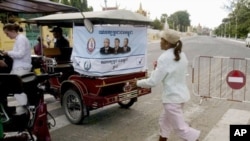WASHINGTON DC - Opposition officials say that the ruling Cambodian People’s Party, worried about the strength of the opposition, has begun employing unfair methods ahead of the July election to secure seats in the parliamentary polls, jeopardizing early the chances for free and fair elections.
Kem Sokha, head of the the Human Rights Party, told VOA Khmer the opposition, which currently holds 29 seats in the National Assembly, needs 30 seats to call government officials before the assembly and 42 seats to block sessions in cases where they believe laws will be passed harmful to the country. With up to 60 seats, or nearly half the assembly, they will have a powerful opposition, he said.
That means the ruling party will do everything it can to prevent any number of gains for the opposition, he said, including preventing the return of opposition leader Sam Rainsy; halting the reform of election laws biased to the ruling party; and other means. Without reforms, opposition officials say, the July 28 elections will not be seen as free and fair.
“If we win really close to 50 or 60 seats, the same [number as the ruling party], then Cambodia will have a large opposition party, which the ruling party worries about,” he said. “They’ll do whatever is possible to reduce our victory.”
The opposition Human Rights and Sam Rainsy parties will join into one, the Cambodia National Rescue Party, for the elections, which supporters say will lessen the choices for the voting public and increase the opposition’s odds of winning more seats. Kem Sokha said that in an election held to “minimum international standards,” the opposition would win the election.
The opposition leader, Sam Rainsy, will not be able to compete in the elections. He remains in exile, facing up to 12 years in prison on charges he says are politically motivated. Ruling party officials, including Prime Minister Hun Sen, say his case is for the courts to decide.
The Sam Rainsy Party currently holds 26 of 123 National Assembly seats. The Human Rights Party has just three. That has meant that since the 2008 elections, the ruling party, with 90 seats, has had tight control of the legislative body. In December, the opposition was unable to influence control over the national budget for 2013 and other legislation.
Opposition spokesman Yim Sovann, who is currently a lawmaker for the Sam Rainsy Party, said if the opposition wins more seats, it will create “a huge impediment for the authoritarian leaders.”
A majority of 63 seats in the National Assembly would allow the opposition to form the government and adopt most of its planned reforms, he said. For this reason, Hun Sen and his ruling party are unwilling to allow Sam Rainsy’s return, or to reform the National Election Committee and its regulations, he said.
“The ruling party today surely knows that if the elections are free and fair, and additionally that if Sam Rainsy can return with more popularity, then they will not defeat the Cambodia National Rescue Party,” he said.
Cheam Yiep, a senior lawmaker for the Cambodian People’s Party, dismissed allegations of electoral malfeasance.
“I wish to inform Sam Rainsy the individual that he is not someone the Cambodian People’s Party fears at all,” he said. “It is normal [for us] to win. We are not afraid.”
The opposition has been able to do nothing for its constituents, he said, and the CPP has 5 million supporters, compared to 1 million supporters of the Sam Rainsy Party. The opposition has protested in the National Assembly and boycotted sessions, showing “no participation” in the legislative process following its defeat in 2008, he said.
“How will the people put their confidence in him compared to the Cambodian People’s Party?” he said. “Gold remains gold.”
Yim Sovann said the ruling party has used the courts, which are widely viewed as biased to powerful interests, to prevent Sam Rainsy’s return, against the urging of the international community. International donors and powerful countries “see that the Cambodian People’s Party is concerned and using unfair tricks to gain victory in 2013,” he said.
Yim Sovann and Kem Sokha say the Cambodia National Rescue Party has a clear policy and strong unity at the national and local levels, making them attractive to supporters. This has come at a time when Cambodia is facing serious challenges, such as land grabs, forced evictions, major human rights violations and poverty, he said.
Cheam Yiep said the ruling party is leading the country in the right direction, with full recognition by the international community.
“The Cambodian People’s Party is trying all its best to make people trust, love and additionally vote for us in the future,” he said.
Concerned Ruling Party Already Making Election Unfair, Opposition Says
- Sok Khemara
- VOA Khmer






